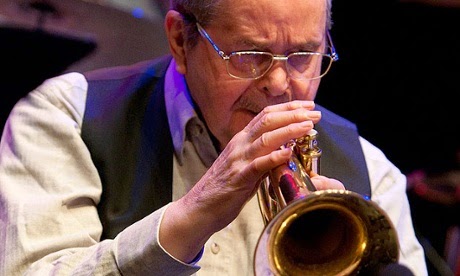John Fordham pays tribute to the late jazz composer by remembering some of the best works by a man who often underplayed his visionary abilities.
Kenny Wheeler, the great Canadian jazz composer and trumpeter who died this week aged 84 in his adopted London, was a very long way from loquacious. But when he did talk, he would get quickly to the point. In an interview with the Guardian on the eve of his 80th birthday tour, Wheeler memorably announced: “What I like doing best is writing sad tunes, and then letting wonderful musicians destroy them. I don’t want the players to try to interpret what they think I’m feeling.”
He once dismissed the talent that had turned his themes into globally performed jazz standards, and brought him world-class interpreters including Keith Jarrett, Jan Garbarek and Bill Frisell, as belonging to someone who “just takes pretty songs and joins them up.” Wheeler felt that a mix of visionary insights and shaky efforts to negotiate life on the artistic and economic margins often characterised jazz musicians, and it was no coincidence that his first big composing venture – 1968’s Windmill Tilter, for John Dankworth’s orchestra – was about Don Quixote, the legendary loser.
Here are some of the musician’s greatest moments from his career.
Sweet Dulcinea Blue
Wheeler came to London from Toronto in 1952, studied with Richard Rodney Bennett, became fascinated with the harmonies of classical composer Paul Hindemith, and played supple, succinct bebop trumpet in the 1960s with London jazz stars including the late Joe Harriott and Tubby Hayes, and free-improv with the pioneering Spontaneous Music Ensemble. In 1968, John Dankworth invited Wheeler to compose a suite for his all-star orchestra, at that time including such soon-to-be-luminaries as guitarist John McLaughlin and bassist Dave Holland. Above is a typical piece of early-Wheeler pensiveness from that session, Sweet Dulcinea Blue.
Gnu Suite
Wheeler was famously shy, hated listening to his own work, and was far too doubtful of his talents to grasp the baton of bandleading that Windmill Tilter had offered him. Seven years were to pass before he accepted another challenge to leave his regular role as an inspired improviser and enhancer of other people’s work - when ECM Records boss Manfred Eicher’s faith in him opened the next door, with 1975’s Gnu High session for the Munich company, fronting an A-list American trio of Keith Jarrett (piano), Dave Holland (bass) and Jack DeJohnette (drums).
Opening
Wheeler made a string of superb albums for ECM in the 1970s and 80s, including Deer Wan (with Jan Garbarek) and Double, Double You (with Michael Brecker), but Music for Large and Small Ensembles, in 1990, was his biggest triumph – a fusion of North American folk music, abstract jazz, and imaginative expansion of the tone-palette and harmonic resources of a jazz lineup. As he was to do through much of his career, Wheeler used the voice of his friend and alter-ego Norma Winstone as an illuminating extra instrument. Here’s Opening, from Wheeler’s Sweet Time Suite.
Kind Folk
Kenny Wheeler’s assessment of his talents as primarily about “pretty songs” was both a massive understatement and recognition of his unique melodic ear, the skill that led musicians of all persuasions and ages all over the planet to perform his music. Here’s a very famous one – with a title both true of Wheeler, and people he was happiest hanging out with – Kind Folk, from 1995’s Angel Song, with Lee Konitz on alto sax, Bill Frisell on guitar and Dave Holland on bass.
Everybody’s Song But My Own
But of all Kenny Wheeler’s compositions, it’s Everybody’s Song But My Own – the classic his sidemen liked to introduce as “Kenny’s hit” that has been the most widely played, and widely loved. Typical of Wheeler in imparting the sense of being sung even when it isn’t, joining playfulness and phlegmatic resignation, and sounding shapely and complete while remaining wide open for improvisers, it will be played by a lot of jazz musicians in a lot of far-flung places over the coming days.

No comments:
Post a Comment